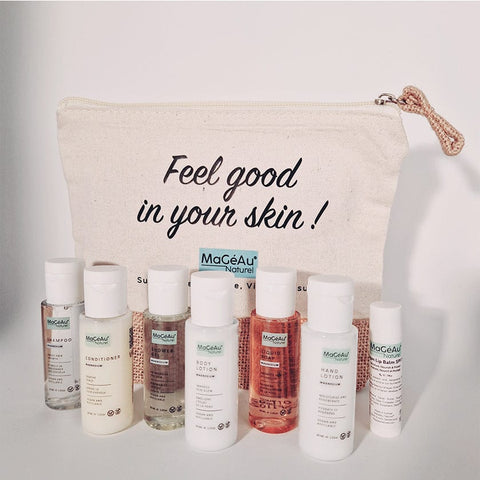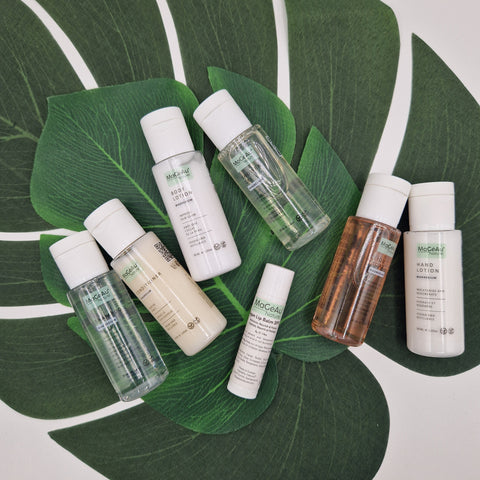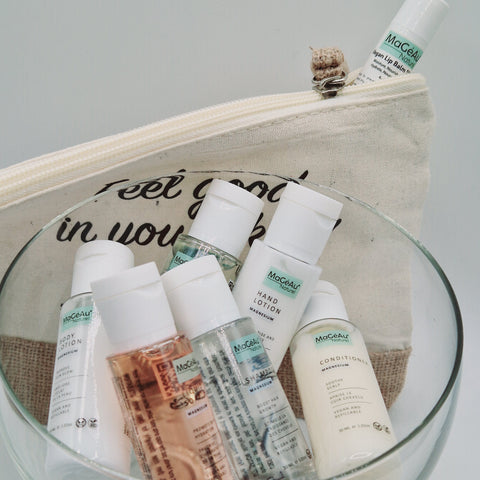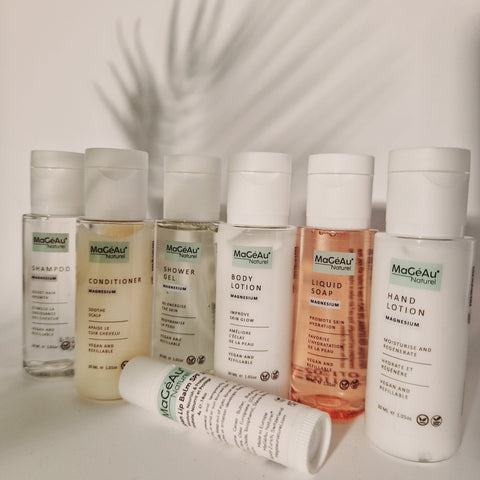




Mini Travel Essentials Set
7x30ml
Bath, Body and Hair with Lip Balm.
✔ Healthy, fresh, and glowing skin.
✔ Hydrate, protect, and restore hair .
✔ Your beauty routine while traveling.
✔ Nourished, soft and smooth skin and hair.
Beauty Routine Disrupted While Travelling?
Exposing your skin and hair to dry cabin air, changing climates, and unfamiliar products can irritate and damage your skin and hair.
Busy schedules don’t leave time to track down high-quality travel-sized options, and single-use plastics from hotel amenities create unnecessary waste, leaving you feeling guilty about your environmental impact.
Acne Breakouts and Dryness While Traveling
Whether you're battling dry airplane air or adjusting to a tropical climate, traveling can wreak havoc on your skin and hair. For those with sensitive skin, the risks are even higher. Switching products mid-trip can lead to breakouts, dryness, or redness that overshadow the joys of your adventure.
The Solution to Protect Your Skin
MaGéAu Naturel Travel Essentials Set is the perfect all-in-one solution for maintaining your self-care routine on the go. Designed with convenience in mind, the compact, spill-proof packaging ensures a hassle-free experience and complies with airline regulations.
Travel Beauty Tips
- Improve Skin Texture: Once you’re home, indulge in a soothing mask or nourishing serum to restore balance and replenish moisture.
- Balance Routine: Adapt your beauty routine to different climates, from dry airplanes to tropical destinations.
Haircare and Skincare Routine on The Go
Use skincare that supports your skin barrier, like those enriched with magnesium or antioxidants, to prevent irritation and redness.
Share your natural skincare and haircare best secret by offering our Gift Set with someone special.
Sustainable Face, Hair and Body Care
Whether you’re traveling for business or leisure, MaGéAu Naturel ensures your self-care routine stays intact, your luggage stays light, and your impact on the planet stays minimal with our refillable and reusable products.
Say goodbye to the hassle of compromising on quality or convenience. This travel set is your passport to healthy, happy skin and hair, wherever you roam.
Aqua (Water), Simmondsia Chinensis (Jojoba) Oil, Cetearyl Olivate, Sorbitan Olivate, Lactobacillus Ferment, Magnesium Chloride, Tocopherol (Vitamin E), Chamomilla Recutita (Chamomile) Extract, Fragrance
At MaGéAu Naturel, we prioritise sustainability in every aspect of our business, including shipping. That's why we offer carbon-neutral shipping at no extra cost to you.
If you would like to support our commitment to sustainability, you can choose to participate in carbon-neutral shipping at checkout. Every contribution helps us continue our mission of providing eco-friendly skincare solutions.
We currently ship within European countries, including the UK and Switzerland, to reduce CO2 production and minimise our environmental impact. Orders over 40€, 35£, or 40CHF qualify for free shipping and will be processed promptly.
In the unlikely event that your parcel arrives damaged, please contact our customer service team for assistance through the Contact form.
By choosing MaGéAu Naturel, you're not only investing in natural skincare but also contributing to a healthier planet. Thank you for joining us in caring for our planet.

Made in Europe

No Paraffin or Parabens

Cruelty Free

No Sulfates or Silicones
Each product maintains the brand's quality standards.
Chaque produit est de haute qualité.
Compact sizes perfect for travel.
Tailles compactes idéales pour les déplacements.
I came back home with skin that still felt pampered.


